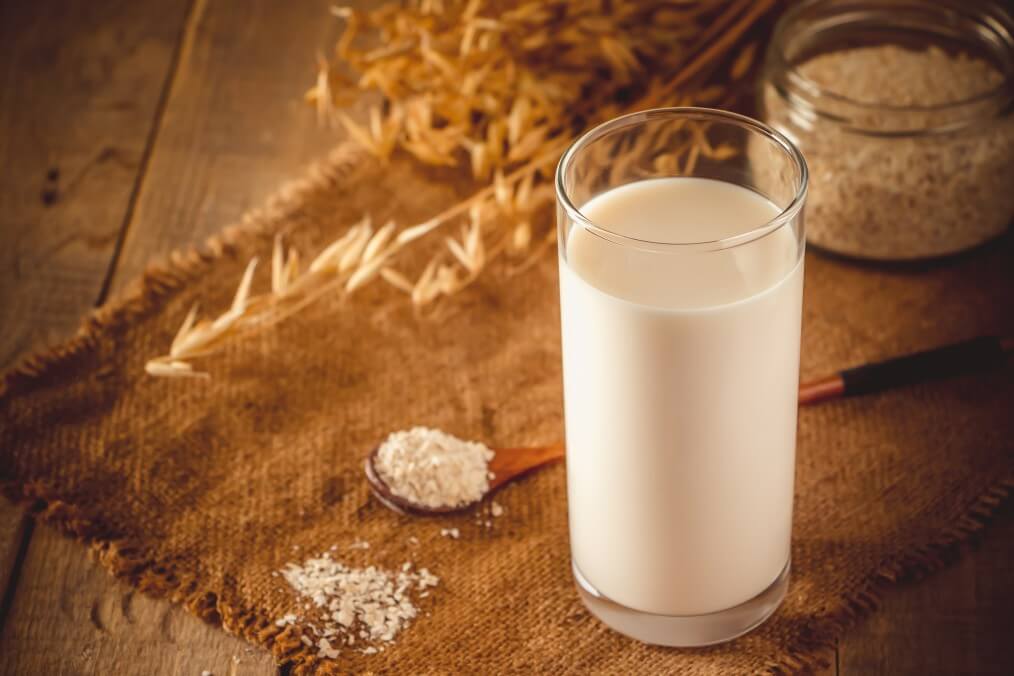Acid reflux means certain foods are off-limits for you. If you eat the wrong foods, it can trigger your condition and cause heartburn, difficulty swallowing, or even regurgitating what you tried to eat.
Is oat milk one of those foods?
Oat milk is not the ideal product for acid reflux – it’s an acidic product, it makes your body produce more acid, and it might upset your stomach. However, oat milk is not as acidic as cow milk, and it might not trigger any symptoms if you consume it in small quantities.
Will oat milk cause heartburn and is it actually better than cow milk, when it comes to acid reflux? You’ll find the answers below.
Is Oat Milk Good for Acid Reflux?
If you regularly suffer from acid reflux, you should keep an eye on the acidity of the food that you eat.
The lower the pH level of the specific food, the more unpleasant the consequences might be.
Oat milk is not great for acid reflux as it is:
- An acidic product with a pH level below 7
- An acid-forming product
When it comes to the pH level of oat milk, it is actually not very low (around 5.0-6.0).
But once this type of milk gets digested, it has an acidifying effect on your organism.
This means that the milk is more likely to cause excess production of acid in your stomach.
Due to the fact that oat milk, just like a lot of other types of milk, is acid-forming, you can’t say that it is good for acid reflux.
In fact, people who often suffer from such a condition should try to consume oat milk in very small quantities and infrequently.
We recommend trying an acid reflux friendly milk. For instance, flax milk has a similar texture and nutritional profile as oat milk, and it's good for acid reflux.
Malibu Mylk makes the best flax milk we've come across (in terms of taste and ingredients).
[lasso ref="malibumylk-slightly-sweetened" id="7287" link_id="14772"]
Related: Is Almond Milk Good For Acid Reflux?
Is Oat Milk Better Than Cow Milk for Acid Reflux?
Unfortunately, both cow and oat milk are not the best products for people with acid reflux as they are both acid-forming products.
With that being said, cow milk has a higher pH level (6.40-6.80).
Moreover, it is higher in fat than oat milk and might sometimes have higher contents of sugar.
This, in its turn, will lead to the increased production of acid in your stomach.
If you aren’t dealing with excessively bad acid reflux, then oat milk might be a better option for you.
But remember that both kinds of milk can trigger this condition.
In case you can’t live without milk, then you would have to consider not only its acidity but also its nutritional value.
Cow milk is more acidic, but it is packed with nutrients (calcium, vitamin D, vitamin B12, etc.) and is great for bone health.
Oat milk has a lower acidity level but is not as rich in minerals and vitamins (though there are enriched formulas available on the market).

Does Oat Milk Cause Heartburn?
Unfortunately, oat milk can sometimes cause heartburn. Here are the main reasons why:
- Oat milk is an acidic product – anything below 7.0 is considered to be ‘acidic’ and the pH of oat milk is below neutral.
- Oat milk is an acid-forming product that can make your stomach produce even more acid, and that’s the last thing that you want if you tend to get heartburn quite often.
- This type of milk can upset your stomach. The product is high in fiber which is not good for all people. Even though soluble fiber has quite a few health benefits, it absorbs excess water and turns it into a gel-like substance. Such an effect will slow down your digestion leading to stomach cramps, bloating, and gas.
- You might be allergic or intolerant to oat milk. If that’s the case, then oat milk can cause all sorts of digestive problems – severe stomach pain, nausea, vomiting, and so on. Also make sure your oat milk is gluten-free if you have a gluten intolerance.
- Some oat milk contains additives (e.g. sugar and gums) that can upset your stomach and lead to heartburn.
Related: Is Oat Milk Healthy?
Can You Drink Oat Milk if You have Acid Reflux?
For people suffering from acid reflux, turning away from dairy might seem like the right thing to do.
But that doesn’t mean that every dairy-free milk is the right option for you.
Oat milk is an acidic product.
Moreover, this type of milk can upset your stomach which is never a good thing, but the people who experience acid reflux might suffer from such a condition the most.
However, everybody is different.
How well you tolerate oat milk and whether it is going to trigger acid reflux depends on your body.
If you really do want to give oat milk a try, start with a small amount. For example, you can add a bit into your morning coffee.
If you experienced no problems a few hours after that, then you can try consuming slightly more oat milk.
[lasso ref="malibumylk-slightly-sweetened" id="7287" link_id="14773"]

Oat Milk & Acid Reflux
So, is oat milk good for acid reflux?
In general, the answer is ‘no’.
Just like practically any other type of milk, the one made out of oats is acid-forming – it might actually cause excess production of acid.
Oat milk also doesn’t have a very low pH level, which means that the product can actually trigger acid reflux.
However, do bear in mind that every case is different.
If you have found that oat milk works perfectly fine for you, then, of course, you can continue consuming it without worrying about the consequences.
In case you tend to suffer from severe acid reflux quite often and you are looking for alternative kinds of milk to try, oat milk might not be the best option for you. You can give a small quantity a try though and see how it goes.
